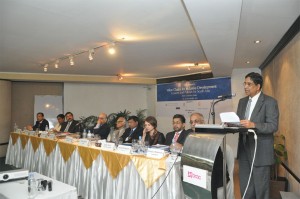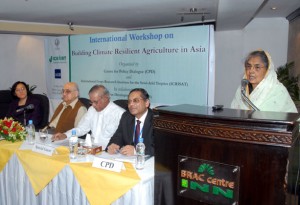Flash floods in the haor areas of Bangladesh have damaged about 156,000 tonnes of Boro crops on around 40,000 hectares of land, said Begum Matia Chowdhury, at the inauguration of a two-day workshop on Building Climate Resilient Agriculture in Asia, jointly organised by the CPD and the International Crops Research Institute for the Semi-Arid Tropics (ICRISAT), Hydrabad, India with support from the Asian Development Bank (ADB), on 5-6 May 2010 at the BRAC Centre Inn Auditorium, Dhaka. 43 participants from various government and non-government organisations of the seven countries covered under the study attended the workshop. Begum Matia Chowdhury, Hon’ble Minister for Agriculture was present as the Chief Guest at the inaugural session, and Dr Abdur Razzaque, Hon’ble Minister for Food and Disaster Management was the Chief Guest of the concluding session. Dr M C S Bantilan, Global Theme Leader, ICRISAT made a presentation at the inaugural session where she gave an introduction to the ongoing cross-country research project titled Vulnerability to Climate Change: Adaptation Strategies and Layers of Resilience. She informed the audience about the focus of the study and elaborated on the expected outcome of the workshop.
Begum Matia Chowdhury highlighted some of Bangladesh’s achievements regarding development of salinity and drought-tolerant crop varieties in view of adapting the country’s agriculture towards climate vulnerabilities. Drawing attention to the issue of over-mining of the underground water, she said it has led to the arsenic problem in the country, and desertification in the northern region. However, the practice of rainwater conservation is yet to be adapted in an extentsive manner in Bangladesh. This is causing massive depletion to our below-surface water reservoir.
Participants at the workshop discussed farmers’ perception and adaptation strategies for Bangladesh and other Asian countries in the face of climate change by developing agendas based on grassroot level adaptation. They also shared cross-country climatic analysis using microlevel data matching with farmers’ perception about reality, government response to climate change, and adaptation to climate change for food security.
Dr Razzaque, the Chief Guest at the concluding session also took a cautionary tone and observed that sea level rise is already a threat to the coastal areas of Bangladesh, while the regional poverty situation and national inflation is creating additional burden for the climate-victims. Considering these issues, the Bangladesh government has finalised an action plan, and allocated Tk. 700 crore for the preparation to minimise the adverse impacts of natural disasters in future, he added.
Professor Rehman Sobhan emphasised on institutional arrangements to combat the adverse impacts of climate change in Asian countries.
A synthesis report was presented to draw the conclusion to the workshop by Dr M C S Bantilan. She observed that farmers are aware of the changes and effects of climate change, and “it is our turn now to help them with new technologies and effective methods and policies for combating the hazards and disasters.” Wrapping up the session Professor Mustafizur Rahman, Executive Director, CPD remarked that the governments of all the affected countries have to focus on agricultural research and inventions to deliver farmer-friendly and compatible measures to enable their respective agricultural sectors to cope with the changed environment.





